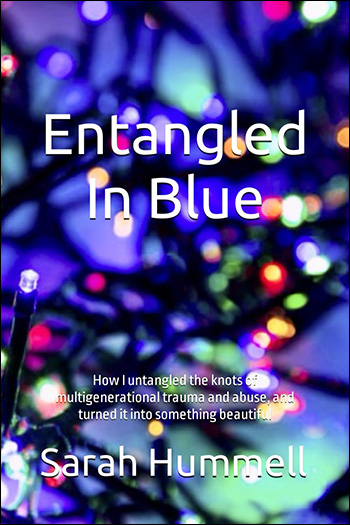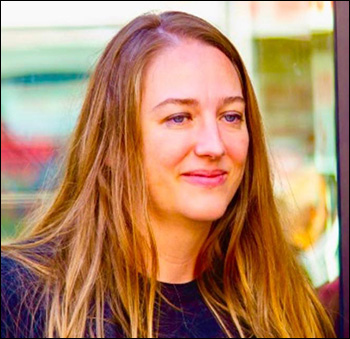

















|

Breaking the Cycle of
Multi-Generational Trauma
With Sarah Hummell
By Samantha Skelton
Sarah Hummell came from a challenging childhood, while struggling with undiagnosed/untreated Dyslexia and dealing with her father’s post-traumatic stress from the Vietnam War alongside her mother.
Though she defied everyone’s expectations and went on to find success in the academic and career world, she found herself in her own abusive marriage that jeopardized her life.
In this interview, we delve into a compelling conversation with Sarah, who authored the book “Entangled in Blue.”
We talk about Sarah’s background, her harrowing personal experiences, and the profound insights she has gained from her journey.
The conversation sheds light on multi-generational trauma, the importance of recognizing red flags in abusive relationships, and the power of breaking the cycle of abuse.

I’d love to know where you grew up and what your educational journey has been?
Sure, I’m originally from Buffalo, New York. I earned my master’s degree at Canisius College, Wehle School of Business, and my bachelor’s degree is from Niagara University College of Hospitality Tourism Management.
I spent the first part of my adult life in Buffalo running coffee shops, restaurants, and hotels before moving to North Carolina, which I humorously call my “nine years in Oz.” My arrival in North Carolina was quite dramatic, as I landed at the Greensboro Airport during a tornado.
Wow! What was that like?
Oh, it was quite an experience. I had a layover in D.C. and was stuck on the runway due to heavy rain. As I landed in North Carolina, I noticed crash trucks with their lights on the runway, which struck me as odd.
It was only when I met my husband at the airport, and he looked pale with fear, that I learned a tornado had just passed through while my plane was making its descent.
Well, that certainly was quite a welcome to North Carolina! To go back to your childhood, what was your family dynamic like growing up?
I grew up as an only child. My dad was a Vietnam veteran who suffered from post-traumatic stress disorder, which made for a challenging environment at home. My parents often argued, putting me in the middle.
I became my mother’s source of emotional support during their fights. Even though my father’s behavior frightened me, he was the only person in the world who made me feel safe. This peculiar dynamic likely influenced my later experiences.
How did undiagnosed Dyslexia affect your childhood, and when did you become aware of it?
I can write another book, just about that! I knew that I was smart, but I saw things differently from my peers. I could never read the eye chart, so I was given thick glasses with bifocals that ruined my eyesight. I was, of course, made fun of.
I would mix up “b’s” and “d’s” in multiple-choice tests, so my grades suffered. By sixth grade, I was still at a first grade reading level. I became known as the “dumb kid,” and the teasing progressed to physical bullying.
Despite maintaining a solid C average, I was declared ineligible for extracurricular activities due to my low reading level. I was the first chair violin in the Orchestra, and I still remember Mr. Cohen, my Music Teacher, trying to advocate for me.
The school psychologist finally tested me. Despite citing that, I saw an f as a j and a g as a q; the word Dyslexia was never mentioned. He recommended reading and math lab, which didn’t help.
Due to a high IQ, I was not eligible for further services, and my parents were told I just needed to apply myself. They took me out of dance lessons and Girl Scouts until I would get my grades up. That never happened.
By eighth grade, I was still at a first grade reading level. I refused to read out loud in class, and my teachers either shamed me into trying harder or wrote me off as either stupid or lazy.
It wasn’t until I watched a movie featuring a boy with Dyslexia that I recognized my condition. It was like I finally cracked the secret code to the English language! Once I understood my condition, I learned to read on my own and developed coping mechanisms.
By the end of high school, I caught up with the rest of my peers. I was accepted into all the colleges I applied to, only to find my parents spent my college savings, thinking I wouldn’t get in. I still didn’t give up and worked full-time while attending school to put myself through college.
Strangely, I was never formally tested for Dyslexia, even though my children later struggled with it, leading to their diagnosis. While advocating for them, I am now researching how trauma affects a child’s ability to learn.
Despite my struggles, I have an insanely good memory due to my inability to rely on reading from notes. I always triple-check my work, and I developed an immense amount of resiliency, which has led to a persistent determination to achieve what most find to be impossible.
All of this has made me a creative problem solver, and when others say, “Way to think outside the box!” I didn’t even know the box was there!

Were you aware of how your family dynamics affected you, or did that awareness come later in life?
Initially, I believed I had a happy childhood despite my struggles in school and the disturbing moments when my parents fought.
Looking back, I would hide under the covers in my room, listening to my dad threaten to keep me away from my mom by accusing her of being an unfit mother.
Now that I have my own kids, I see how these experiences shook my sense of stability and safety, and it is now my goal to end the cycle of multi-generational trauma.
Your new book, “Entangled in Blue” discusses abusive relationships and your own personal journey navigating that difficult terrain. Can you tell us more about a pivotal moment for you that you touch on in the book?
Yes, “Entangled in Blue” tells the story of what happened after that pivotal moment in my life. My husband fired a gun in front of our two small children, and the bullet narrowly missed my head, leading to his involuntary commitment for 11 days.
He was only charged with a misdemeanor and was given courtesy as a first responder, so I no longer felt safe where I lived. I had to leave my life behind, including my home, business, community, and support system, to protect my children from experiencing further violence.
Your book also dives into multi-generational trauma. Can you elaborate on this concept and its significance?
Multi-generational trauma is a profound theme. It’s often said that “hurt people hurt people.” Children who witness or experience abuse may either perpetuate that behavior or develop compassion and strive to break the cycle.
Trauma can be inherited through generations and, without a healthy example to replicate, can lead to unhealthy relationships and the normalization of abusive behavior. The choice to stop the cycle requires enormous strength.
I hope to raise awareness of this issue to encourage others to break the cycle. The cycle stops with me!
What steps can individuals take to break the cycle of multi-generational trauma and become more aware of their actions? Is this something you talk about in your book?
Yes, absolutely. To break the cycle, I think people must reflect on their childhood experiences, empathize with their children, and consider their pain growing up.
Recognizing and acknowledging past traumas is the first step to ensuring our own children do not endure the same suffering.
Could you share a significant takeaway from your book for readers, especially those who may not currently be in an abusive situation?
One major takeaway I hope readers gain is the ability to recognize red flags in relationships, especially during the early stages.
By trusting their intuition and acknowledging manipulative and controlling behavior, individuals can prevent themselves from entering abusive relationships. Awareness of these patterns can save lives, as abusive situations tend to escalate over time.
What advice do you have for those who are currently in an abusive situation and struggling to escape it?
For those already in an abusive relationship, you are not alone! I urge you to seek help and not suffer in silence. It’s powerful to name the abusive behavior and realize that it’s not your fault.
The road to recovery is tough, but it’s the only way to break free from the cycle of abuse. Leaving may be challenging, but staying only prolongs the inevitable, death.
Where can readers find more about you and your book, “Entangled in Blue”?
You can find more information about me and my book at my website: www.EntangledInBlue.com.
Additionally, “Entangled in Blue” is available on Amazon.
Home |
Actors/Models |
Art |
Books |
Dining
Film & Video |
Food & Wine |
Health & Fitness
MediaWatch |
Money and Business |
Music |
Profiles
Professional Services |
Sports |
Style & Fashion
Technology |
Theatre |
Travel & Leisure
Copyright 1995 - 2022 inmag.com
inmag.com (on line) and in Magazine (in print)
are published by in! communications, Inc.
www.inmag.com
|


Advertiser Info
Subscription Form
Contact Us
|



